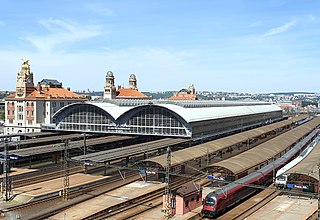
Veolia Transport was the international transport services division of the French-based multinational company Veolia until the 2011 merger that gave rise to Veolia Transdev, later renamed Transdev. Veolia Transport traded under the brand names of Veolia Transportation in North America and Israel, Veolia Transport, Veolia Verkehr in Germany and with the former name Connex preserved in Lebanon, Melbourne and Jersey.
Arriva plc is a British multinational public transport company headquartered in Sunderland, England. It is a subsidiary of Deutsche Bahn.
České dráhy, often shortened to ČD, is the major railway operator in the Czech Republic providing regional and long-distance services.

Praha hlavní nádraží is the largest railway station in Prague, Czech Republic.

Adršpach is a municipality in Náchod District in the Hradec Králové Region of the Czech Republic. It has about 500 inhabitants. It is known for the Adršpach-Teplice Rocks.

The Class 471 electric motor unit, commonly known as CityElefant, is a double deck electric multiple unit operating on 3 kV DC overhead wires produced by Škoda Vagonka, a subsidiary of Škoda Transportation, since 1997 and operated by the České dráhy rail transit operator on its suburban services around Prague and Ostrava, Czech Republic. A single unit consists of a Class 471 power car with first class seating, a single Class 071 passenger car and a Class 971 cab car. They are replacement for defunct ČD Class 451, and successor to scrapped ČD Class 470.

Rail transport in Slovakia began on September 21, 1840, with the opening of the first horse-powered line from Bratislava to Svätý Jur. The first steam-powered line, from Bratislava to Vienna, opened on August 20, 1848.

Železničná spoločnosť Slovensko, a.s. (ZSSK) is a Slovak state-owned passenger train company based in Bratislava.

The RegioSprinter is a German diesel railcar built by Siemens-Duewag for rapid regional railway services. Originally the RegioSprinter was designated as a Regional Combustion-engined Railbus by Duewag.

Správa železnic, státní organizace is the national railway infrastructure manager in the Czech Republic. Its main customers include passenger train operator České dráhy and its cargo subsidiary ČD Cargo.

RegioJet a.s. is a private Czech provider of passenger rail and bus transport. The company Student Agency, owned by Czech businessman Radim Jančura, is the sole owner. A sister company of the same name, with its registered office in Bratislava, is an operator of passenger rail and bus transport in Slovakia.
Abellio is a Dutch public transport company that operates bus and rail services in Germany, and formerly also in Czech Republic, the Netherlands, and the United Kingdom. It is wholly owned by the Dutch national railway company, Nederlandse Spoorwegen (NS).

Rail transport in the Czech Republic carried 193.5 million passengers in 2019, and 68.37 million tonnes of cargo in the year 2009. The majority of passenger services run nowadays are operated by the state company České dráhy, which until 2007 also managed cargo services now run by ČD Cargo. In 2009 the country had 9,420 km of standard gauge track, 3,153 km of which is electrified. There are two main electrification systems in the Czech Republic, 3 kV DC in the northern part, and 25 kV 50 Hz AC in the south. Locomotives had to be changed on boundaries in the past, two-system locomotives have been introduced in 1974. The network has same gauge links to all four countries bordering the Czech Republic with passenger services to all four countries in operation. Major hubs for international passenger services on the network are in Prague, Ostrava, Brno and Břeclav, and the busiest station is Praha hlavní nádraží. Maximum speed on Czech rails is 160 km/h (99mph).

Leo Express, formerly Rapid Express, is an open-access train operator in the Czech Republic, established in 2010. It launched inter-city services in November 2012 on the Prague–Ostrava route, on which state-owned operator Czech Railways and open-access operator RegioJet were already running trains.

High-speed rail in the Czech Republic is being planned with construction starting in 2026 and maximum speed between 200 and 320 km/h. Although České Dráhy owns and operates multiple rolling stock capable of speeds of 230 km/h (143 mph) since 2004, there is, as of 2023, no infrastructure capable of velocity over 200 km/h (124 mph). The only exception is the 13.3-kilometre long track at Velim railway test circuit with a maximum allowed speed of 230 km/h (143 mph) for tilting trains and up to 210 km/h (130 mph) for conventional trains. Czech rolling stock manufacturer Škoda Transportation has produced high-speed rolling stock since the 1970s.

Škoda 7Ev is an electric multiple unit produced by Škoda Transportation. The trainset was developed at the order of the České dráhy in 2011.

Siemens Viaggio Comfort is a brand of locomotive-hauled railroad passenger cars built by Siemens Mobility. The car was designed in the early 2000s and was based on the earlier Siemens Viaggio Classic railcars. The railcars were first used in 2008 on Railjet, a high-speed rail service in Europe operated by the Austrian Federal Railways (ÖBB) and Czech Railways (ČD).

The 2021 Světec train crash was a collision of two freight trains, which occurred at Světec railway station in Světec, Czech Republic on 4 April 2021 at 14:16 CEST. An express freight train, no. 54334, operated by ORLEN Unipetrol Doprava (UNIDO) and hauled by a CZ Class 753.7, collided with a continuous freight train, no. 66403, operated by ČD Cargo (ČDC) and hauled by a CZ Class 123. The driver of the UNIDO train, which was carrying tank cars filled with propane and butane, died upon impact. The driver of the ČD Cargo train, which was carrying coal, saved himself by jumping out of the locomotive. A fire broke out on one of the locomotives, and 9 firefighter units and an air ambulance responded to the accident. According to preliminary information, the railway signalling had worked correctly, so the accident was probably caused by the UNIDO train driver killed in the crash.

ComfortJet is a high-speed push-pull train which is being built by Siemens Mobility and Škoda Transportation for the Czech train operator České dráhy and it is planned to start operations from 2024. It will operate at speeds of up to 230 km/h and will replace old carriages on international EuroCity services between the Czech Republic, Germany, Denmark, Austria, Slovakia and Hungary and on domestic InterCity services in the Czech Republic.
Praha–Rajská zahrada is a railway halt located in Kyje in Prague 14. It lies on the railway line from Prague to Nymburk, near the metro station of the same name, and was opened on 10 December 2023. It is served by fast trains from Prague to Nymburk and Neratovice as well as local services integrated into the Esko Prague system. It is connected to Prague metro, and to local and city buses.




















